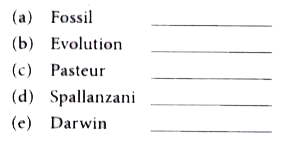Who disproved the theory of spontaneous generation?
Darwin
Hugo de Vries
Pasteur
Alfred R Wallace
The correct Answer is:C
Step-by-Step Text Solution:
1. Understanding the Theory of Spontaneous Generation:
- The theory of spontaneous generation suggests that living organisms can arise from non-living matter without the need for reproduction from existing living organisms. This idea was first proposed by Aristotle around 350 B.C. He believed that under certain conditions, such as the presence of "vital heat," life could emerge from dead matter.
2. Historical Context:
- Aristotle's hypothesis was supported by observations such as maggots appearing on decaying meat and mice emerging from corn. These observations led to the belief that life could spontaneously generate from non-living materials.
3. Early Experiments:
- Several scientists conducted experiments to test this theory. Francesco Redi, for example, performed an experiment using two jars with fresh meat. One jar was left open, while the other was sealed. He observed that maggots appeared only in the open jar, demonstrating that they came from fly eggs and not from the meat itself. This was an early challenge to the theory of spontaneous generation.
4. Further Challenges:
- John Needham conducted experiments where he heated broth to kill microbes, believing this would prove that life could arise spontaneously. However, he still found life in the broth, which led to further debate about the validity of spontaneous generation.
- Lazaro Spallanzani later criticized Needham’s methods, arguing that Needham did not heat the broth sufficiently to kill all microbes, thus allowing for contamination.
5. The Definitive Experiments:
- The theory of spontaneous generation was ultimately disproved by Louis Pasteur in the 19th century. Pasteur designed a series of experiments using S-shaped flasks that allowed air in but prevented microbial contamination. When he boiled the broth in these flasks, it remained sterile, demonstrating that without contamination, no life could arise.
6. Conclusion:
- Louis Pasteur's experiments provided strong evidence against the theory of spontaneous generation, leading to the conclusion that life arises from existing life, not spontaneously from non-living matter. Therefore, the correct answer to the question of who disproved the theory of spontaneous generation is Louis Pasteur.
---
- The theory of spontaneous generation suggests that living organisms can arise from non-living matter without the need for reproduction from existing living organisms. This idea was first proposed by Aristotle around 350 B.C. He believed that under certain conditions, such as the presence of "vital heat," life could emerge from dead matter.
- Aristotle's hypothesis was supported by observations such as maggots appearing on decaying meat and mice emerging from corn. These observations led to the belief that life could spontaneously generate from non-living materials.
- Several scientists conducted experiments to test this theory. Francesco Redi, for example, performed an experiment using two jars with fresh meat. One jar was left open, while the other was sealed. He observed that maggots appeared only in the open jar, demonstrating that they came from fly eggs and not from the meat itself. This was an early challenge to the theory of spontaneous generation.
- John Needham conducted experiments where he heated broth to kill microbes, believing this would prove that life could arise spontaneously. However, he still found life in the broth, which led to further debate about the validity of spontaneous generation.
- Lazaro Spallanzani later criticized Needham’s methods, arguing that Needham did not heat the broth sufficiently to kill all microbes, thus allowing for contamination.
- The theory of spontaneous generation was ultimately disproved by Louis Pasteur in the 19th century. Pasteur designed a series of experiments using S-shaped flasks that allowed air in but prevented microbial contamination. When he boiled the broth in these flasks, it remained sterile, demonstrating that without contamination, no life could arise.
- Louis Pasteur's experiments provided strong evidence against the theory of spontaneous generation, leading to the conclusion that life arises from existing life, not spontaneously from non-living matter. Therefore, the correct answer to the question of who disproved the theory of spontaneous generation is Louis Pasteur.
Topper's Solved these Questions
Similar Questions
Given below are the following terms (letters) with their appropriate definition numbered items).

(i) Boiled broth experiment gave rise to the process. (ii). Trace of a dead organism. (iii) Used swan-necked flask to disprove theory of spontaneous generation. (iv) Change in population over time. (v) Wrote "The origin of species' book.
View SolutionThe theory of spontaneous generation says that
View Solution
Knowledge Check
Which of the following scientists conducted an experiment on 'killed yeast' to disprove the theory of spontaneous generation?
ALouis pasteurBS.L. MillerCA.I. OparinDJ.B.S. HaldaneA: Theory of biogenesis explains that life arises from pre-existing life.
R: Louis Pasteur finally disapproved the theory of spontaneous generation of life.AIf both Assertion & Reason are true and the reason is the correct explanation of the assertion. Then mark (1)BIf both Assertion & Reason are true but the reason is not the correct explanation of the assertion, then mark (2)CIf Assertion is true statement but Reason is false, then mark (3)DIf both Assertion and Reason are falses statements, then mark (4)Pesteur succceeded in disprowinv the theory of spontaneous generation because
AThe laboratory was cleanBHe pulled out the neck of flask into to tubeCHe was luckyDYeast used in flak were dead
Theory of spontaneous generation explains
View SolutionThe theory of spontaneous generation stated that
View SolutionThe theory of spontaneous generation stated that
View SolutionWho completely dissmissed the theory of spontaneous generation:
View SolutionThe proponent of the theory of spontaneous generation was
View Solution
